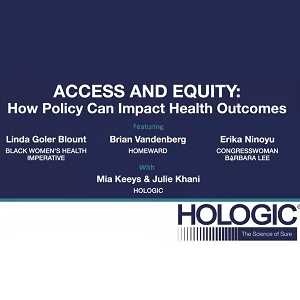Health equity experts, Linda Holer Blount, Brian Vandenberg and Erika Ninoyu joined Julie Khani of Hologic’s Government Affairs team for an insightful webinar exploring how policies can lead to better healthcare outcomes.
The speakers highlighted how unfortunate it is that we live in a society where not everyone has the same heath status, and not everyone has access to health information and essential health services to become or stay as healthy as possible.
Health equity is the state of health that would exist if everyone had access to the same tools, resources and standard of care that they need to make the choices to help them live healthier.
While policies of the past are the contributors to the inequities that we see today, the policy decisions we make today can turn the tide and address the inequities.
The mission is to enable everyone to achieve their best health despite their circumstances or where they are from. We need to consider policies that refer to geographic concerns as where people live can impact their access to care. 80% of the landmass of the U.S. is considered rural, and one in five people in the country live in rural community. Unfortunately, 80% of rural counties do not have sufficient access to care. In other words, this is a workforce shortage issue, and unfortunately the nearest care is often hours away. There are entire counties that do not have a single primary care physician, or a single OBGYN physician.
Therefore, we need to consider how to ensure there is equitable care access available to those who live in remote parts of the country.
Additionally, we need think about cultural and linguistic needs to enable us to understand each population in order to meet their requirements.
It is important we assess how the federal government distributes grant funds to state and local governments, and to try to ensure the funding lands into the hands of the trusted messengers of the community. During the pandemic, Congressman Barbara Lee was able to fight and achieved to set aside funding for underserved communities. She managed to provide grants directly from the federal government to community-based centres, health clinics, and faith-based organisations.
In the last few years there have been issues regarding data that has not been collected in the right way or not collected at all, and scenarios where it has not been used for effective decision making. Collecting the right data is essential when evidence-based decisions are being made; the best data is needed to make the right policy decisions.
It is vital that policy research includes and incorporates lived experiences and diversity representation. Diversity in the C-suite is more likely to lead to diversity in the care team, which is going to lead to people caring for those in similar demographics. Evidence has demonstrated that this can lead to better outcomes.
Hologic thinks about women's health from an individual standpoint to ensure they are targeting the individual needs of women, whilst also recognising that taking care of the woman is essentially an investment in families.
At Hologic it is important to recognise that black and brown women are at a much larger loss with respect to avoidable differences, and with respect to cervical and breast health. Even though black and brown women are diagnosed with advanced cancers at a higher rate compared to white women, it is preventable.
We have to be able to look at the policies we have and consider how we can promote and push for policies that make changes for women in terms of making the best possible choices for their health.
Source: Hologic









